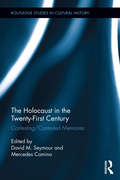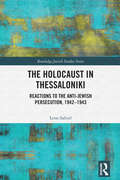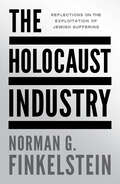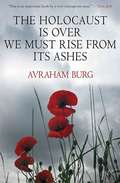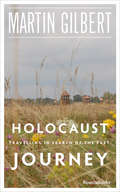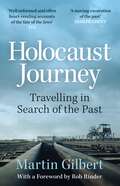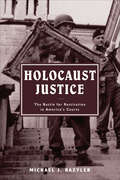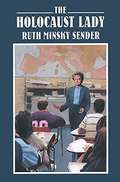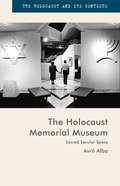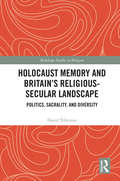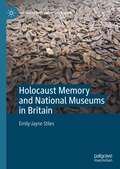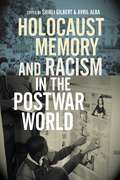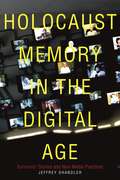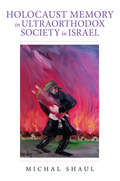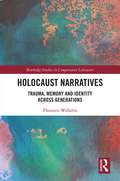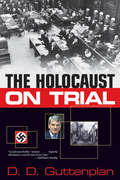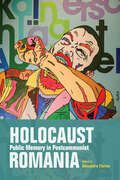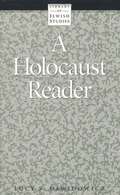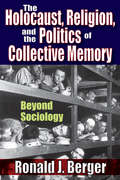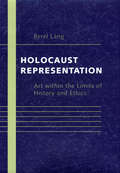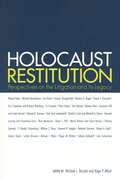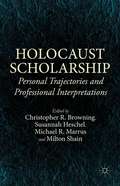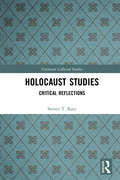- Table View
- List View
The Holocaust in the Twenty-First Century: Contesting/Contested Memories (Routledge Studies in Cultural History)
by David M. Seymour Mercedes CaminoThis volume locates and explores historical and contemporary sites of contested meanings of Holocaust memory across a range of geographical, geo-political, and disciplinary contexts, identifying and critically engaging with the nature and expression of these meanings within their relevant contexts, elucidating the political, social, and cultural underpinnings and consequences of these meanings, and offering interventions in the contemporary debates of Holocaust memory that suggest ways forward for the future.
The Holocaust in Thessaloniki: Reactions to the Anti-Jewish Persecution, 1942–1943 (Routledge Jewish Studies Series)
by Leon SaltielThe book narrates the last days of the once prominent Jewish community of Thessaloniki, the overwhelming majority of which was transported to the Nazi death camp of Auschwitz in 1943. Focusing on the Holocaust of the Jews of Thessaloniki, this book maps the reactions of the authorities, the Church and the civil society as events unfolded. In so doing, it seeks to answer the questions, did the Christian society of their hometown stand up to their defense and did they try to undermine or object to the Nazi orders? Utilizing new sources and interpretation schemes, this book will be a great contribution to the local efforts underway, seeking to reconcile Thessaloniki with its Jewish past and honour the victims of the Holocaust. The first study to examine why 95 percent of the Jews of Thessaloniki perished—one of the highest percentages in Europe—this book will appeal to students and scholars of the Holocaust, European History and Jewish Studies.
The Holocaust Industry: Reflections on the Exploitation of Jewish Suffering
by Norman G. FinkelsteinIt was not until the Arab-Israeli War of 1967, when Israel's evident strength brought it into line with US foreign policy, that memory of the Holocaust began to acquire the exceptional prominence it enjoys today. Leaders of America's Jewish community were delighted that Israel was now deemed a major strategic asset and, Finkelstein contends, exploited the Holocaust to enhance this new-found status. Their subsequent interpretations of the tragedy are often at variance with actual historical events and are employed to deflect any criticism of Israel and its supporters. Recalling Holocaust fraudsters such as Jerzy Kosinski and Binjamin Wilkomirski, as well as the demagogic constructions of writers like Daniel Goldhagen, Finkelstein contends that the main danger posed to the memory of Nazism's victims comes not from the distortions of Holocaust deniers but from prominent, self-proclaimed guardians of Holocaust memory. Drawing on a wealth of untapped sources, he exposes the double shakedown of European countries as well as legitimate Jewish claimants, and concludes that the Holocaust industry has become an outright extortion racket. Thoroughly researched and closely argued, The Holocaust Industry is all the more disturbing and powerful because the issues it deals with are so rarely discussed.
The Holocaust Is Over; We Must Rise From its Ashes
by Avraham BurgModern-day Israel, and the Jewish community, are strongly influenced by the memory and horrors of Hitler and the Holocaust. Burg argues that the Jewish nation has been traumatized and has lost the ability to trust itself, its neighbors or the world around it. He shows that this is one of the causes for the growing nationalism and violence that are plaguing Israeli society and reverberating through Jewish communities worldwide. Burg uses his own family history--his parents were Holocaust survivors--to inform his innovative views on what the Jewish people need to do to move on and eventually live in peace with their Arab neighbors and feel comfortable in the world at large. Thought-provoking, compelling, and original, this book is bound to spark a heated debate around the world.
Holocaust Journey: Travelling in Search of the Past
by Martin Gilbert&“A travelogue, spanning two weeks, of the essential sites of the Holocaust, by the venerable historian and author . . . [A] soul-searching trip&” (Kirkus Reviews). In 1996, prominent Holocaust historian Sir Martin Gilbert embarked on a fourteen-day journey into the past with a group of his graduate students from University College, London. Their destination? Places where the terrible events of the Holocaust had left their mark in Europe. From the railway lines near Auschwitz to the site of Oskar Schindler&’s heroic efforts in Cracow, Poland, Holocaust Journey features intimate personal meditations from one of our greatest modern historians, and is supported by wartime documents, letters, and diaries—as well as over fifty photographs and maps by the author—all of which help interweave Gilbert&’s trip with his students with the surrounding history of the towns, camps, and other locations visited. The result is a narrative of the Holocaust that ties the past to the present with poignancy and power. &“Gilbert . . . is a dedicated guide to this difficult material. We can be grateful for his thoroughness, courage and guidance.&” —Los Angeles Times Book Review
Holocaust Journey: Travelling In Search Of The Past
by Sir Martin GilbertIncludes a new foreword by Rob RinderWhat readers are saying about HOLOCAUST JOURNEY:'Brilliant ... A must read for everybody' ⭐⭐⭐⭐⭐'Devastating' ⭐⭐⭐⭐⭐'Fascinating, thought provoking and shocking' ⭐⭐⭐⭐⭐'Everybody should read this' ⭐⭐⭐⭐⭐'Informative and emotional' ⭐⭐⭐⭐⭐In June 1996 Martin Gilbert took a group of students on a two-week journey across middle-Europe which encompassed all the major places in the Holocaust - from Wannsee where the extermination of the Jews was decreed, to the camps themselves, via deserted Jewish communities and synagogues as well as the sites of the ghettos and deportation.'The achievement of Gilbert's HOLOCAUST JOURNEY is to reduce to comprehensible, human terms of the scale of the genocide that to many is still unimaginable' LITERARY REVIEW'Filled with short, well-informed and often heart-rending accounts of the fate of the Jews' TLS'HOLOCAUST JOURNEY travels along the tracks of a history we would rather forget to the sites of wartime horror, and is also a moving excavation of the past' INDEPENDENT
Holocaust Journey: Travelling In Search Of The Past
by Sir Martin GilbertIncludes a new foreword by Rob RinderWhat readers are saying about HOLOCAUST JOURNEY:'Brilliant ... A must read for everybody' ⭐⭐⭐⭐⭐'Devastating' ⭐⭐⭐⭐⭐'Fascinating, thought provoking and shocking' ⭐⭐⭐⭐⭐'Everybody should read this' ⭐⭐⭐⭐⭐'Informative and emotional' ⭐⭐⭐⭐⭐In June 1996 Martin Gilbert took a group of students on a two-week journey across middle-Europe which encompassed all the major places in the Holocaust - from Wannsee where the extermination of the Jews was decreed, to the camps themselves, via deserted Jewish communities and synagogues as well as the sites of the ghettos and deportation.'The achievement of Gilbert's HOLOCAUST JOURNEY is to reduce to comprehensible, human terms of the scale of the genocide that to many is still unimaginable' LITERARY REVIEW'Filled with short, well-informed and often heart-rending accounts of the fate of the Jews' TLS'HOLOCAUST JOURNEY travels along the tracks of a history we would rather forget to the sites of wartime horror, and is also a moving excavation of the past' INDEPENDENT
Holocaust Justice: The Battle for Restitution in America's Courts
by Michael J BazylerThe first book to tell the complete story of the American attempt at restitution for victims of the HolocaustThe Holocaust was not only the greatest murder in history; it was also the greatest theft. Historians estimate that the Nazis stole roughly $230 billion to $320 billion in assets (figured in today’s dollars), from the Jews of Europe. Since the revelations concerning the wartime activities of the Swiss banks first broke in the late 1990s, an ever-widening circle of complicity and wrongdoing against Jews and other victims has emerged in the course of lawsuits waged by American lawyers. These suits involved German corporations, French and Austrian banks, European insurance companies, and double thefts of art—first by the Nazis, and then by museums and private collectors refusing to give them up. All of these injustices have come to light thanks to the American legal system.Holocaust Justice is the first book to tell the complete story of the legal campaign, conducted mainly on American soil, to address these injustices. Michael Bazyler, a legal scholar specializing in human rights and international law, takes an in-depth look at the series of lawsuits that gave rise to a coherent campaign to right historical wrongs. Diplomacy, individual pleas for justice by Holocaust survivors and various Jewish organizations for the last fifty years, and even suits in foreign courts, had not worked. It was only with the intervention of the American courts that elderly Holocaust survivors and millions of other wartime victims throughout the world were awarded compensation, and equally important, acknowledgment of the crimes committed against them. The unique features of the American system of justice—which allowed it to handle claims that originated over fifty years ago and in another part of the world—made it the only forum in the world where Holocaust claims could be heard. Without the lawsuits brought by American lawyers, Bazyler asserts, the claims of the elderly survivors and their heirs would continue to be ignored.For the first time in history, European and even American corporations are now being forced to pay restitution for war crimes totaling billions of dollars to Holocaust survivors and other victims. Bazyler deftly tells the unfolding stories: the Swiss banks’ attempt to hide dormant bank accounts belonging to Holocaust survivors or heirs of those who perished in the war; German private companies that used slave laborers during World War II—including American subsidiaries in Germany; Italian, Swiss and German insurance companies that refused to pay on prewar policies; and the legal wrangle going on today in American courts over art looted by the Nazis in wartime Europe. He describes both the human and legal dramas involved in the struggle for restitution, bringing the often-forgotten voices of Holocaust survivors to the forefront. He also addresses the controversial legal and moral issues over Holocaust restitution and the ethical debates over the distribution of funds.With an eye to the future, Bazyler discusses the enduring legacy of Holocaust restitution litigation, which is already being used as a model for obtaining justice for historical wrongs on both the domestic and international stage.
The Holocaust Lady
by Ruth Minsky SenderA Simon & Schuster eBook. Simon & Schuster has a great book for every reader.
The Holocaust Memorial Museum: Sacred Secular Space (The Holocaust and its Contexts)
by Avril AlbaThe Holocaust Memorial Museum reveals and traces the transformation of ancient Jewish symbols, rituals, archetypes and narratives deployed in these sites. Demonstrating how cloaking the 'secular' history of the Holocaust in sacred garb, memorial museums generate redemptive yet conflicting visions of the meaning and utility of Holocaust memory.
Holocaust Memory and Britain’s Religious-Secular Landscape: Politics, Sacrality, And Diversity (Routledge Studies in Religion)
by David TollertonBritish state-supported Holocaust remembrance has dramatically grown in prominence since the 1990s. This monograph provides the first substantial discussion of the interface between public Holocaust memory in contemporary Britain and the nation’s changing religious-secular landscape. In the first half of the book attention is given to the relationships between remembrance activities and Jewish, Muslim, Christian, and post-Christian communities. Such relationships are far from monolithic, being entangled in diverse histories, identities, power-structures, and notions of ‘British values’. In the book’s second half, the focus turns to ways in which public initiatives concerned with Holocaust commemoration and education are intertwined with evocations and perceptions of the sacred. Three state-supported endeavours are addressed in detail: Holocaust Memorial Day, plans for a major new memorial site in London, and school visits to Auschwitz. Considering these phenomena through concepts of ritual, sacred space, and pilgrimage, it is proposed that response to the Holocaust has become a key feature of Britain’s 21st century religious-secular landscape. Critical consideration of these topics, it is argued, is necessary for both a better understanding of religious-secular change in modern Britain and a sustainable culture of remembrance and national self-examination. This is the first study to examine Holocaust remembrance and British religiosity/secularity in relation to one another. As such, it will be of keen interest to scholars of Religious Studies, Jewish studies and Holocaust Studies, as well as the Sociology of Religion, Material Religion and Secularism.
Holocaust Memory and National Museums in Britain (The Holocaust and its Contexts)
by Emily-Jayne StilesThis book explores the Holocaust exhibition opened within the Imperial War Museum (IWM) in 2000; setting out the long and often contentious debates surrounding the conception, design, and finally the opening of an important exhibition within a national museum in Britain. It considers a process of memory-making through an assessment of Holocaust photographs, material culture, and survivor testimonies; exploring theories of cultural memory as they apply to the national museum context. Anchored in time and place, the Holocaust exhibition within Britain’s national museum of war is influenced by, and reflects, an international rise in Holocaust consciousness in the 1990s. This book considers the construction of Holocaust memory in 1990s Britain, providing a foundation for understanding current and future national memory projects. Through all aspects of the display, the Holocaust is presented as meaningful in terms of what it says about Nazism and what this, in turn, says about Britishness. From the original debates surrounding the inclusion of a Holocaust gallery at the IWM, to the acquisition of Holocaust artefacts that could act as 'concrete evidence' of Nazi barbarity and criminality, the Holocaust reaffirms an image of Britain that avoids critical self-reflection despite raising uncomfortably close questions. The various display elements are brought together to consider multiple strands of the Holocaust story as it is told by national museums in Britain.
Holocaust Memory and Racism in the Postwar World
by Tony Kushner Dan J. Puckett Milton Shain Suzanne D. Rutland David Slucki James Jordan Marjorie N. Feld Michael E. Staub Michael Rothberg Sarah Phillips Casteel Avril Alba Bashir Bashir Amos Goldberg Steven Cooke Donna-Lee Frieze Shirli Gilbert Dorota GlowackaThe Holocaust is often invoked as a benchmark for talking about human rights abuses from slavery and apartheid to colonialism, ethnic cleansing, and genocide. Western educators and politicians draw seemingly obvious lessons of tolerance and anti-racism from the Nazi past, and their work rests on the implicit assumption that Holocaust education and commemoration will expose the dangers of prejudice and promote peaceful coexistence. Holocaust Memory and Racism in the Postwar World, edited by Shirli Gilbert and Avril Alba, challenges the notion that there is an unproblematic connection between Holocaust memory and the discourse of anti-racism. Through diverse case studies, this volume historicizes how the Holocaust has shaped engagement with racism from the 1940s until the present, demonstrating that contemporary assumptions are neither obvious nor inevitable. Holocaust Memory and Racism in the Postwar World is divided into four sections. The first section focuses on encounters between Nazism and racism during and immediately after World War II, demonstrating not only that racist discourses and politics persisted in the postwar period, but also, perhaps more importantly, that few people identified links with Nazi racism. The second section explores Jewish motivations for participating in anti-racist activism, and the varying memories of the Holocaust that informed their work. The third section historicizes the manifold ways in which the Holocaust has been conceptualized in literary settings, exploring efforts to connect the Holocaust and racism in geographically, culturally, and temporally diverse settings. The final section brings the volume into the present, focusing on contemporary political causes for which the Holocaust provides a benchmark for racial equality and justice. Together, the contributions delineate the complex history of Holocaust memory, recognize its contingency, and provide a foundation from which to evaluate its moral legitimacy and political and social effectiveness. Holocaust Memory and Racism in the Postwar World is intended for students and scholars of Holocaust and genocide studies, professionals working in museums and heritage organizations, and anyone interested in building on their knowledge of the Holocaust and the discourse of racism.
Holocaust Memory in the Digital Age: Survivors’ Stories and New Media Practices
by Jeffrey ShandlerHolocaust Memory in the Digital Age explores the nexus of new media and memory practices, raising questions about how advances in digital technologies continue to influence the nature of Holocaust memorialization. Through an in-depth study of the largest and most widely available collection of videotaped interviews with survivors and other witnesses to the Holocaust, the University of Southern California Shoah Foundation's Visual History Archive, Jeffrey Shandler weighs the possibilities and challenges brought about by digital forms of public memory. The Visual History Archive's holdings are extensive—over 100,000 hours of video, including interviews with over 50,000 individuals—and came about at a time of heightened anxiety about the imminent passing of the generation of Holocaust survivors and other eyewitnesses. Now, the Shoah Foundation's investment in new digital media is instrumental to its commitment to remembering the Holocaust both as a subject of historical importance in its own right and as a paradigmatic moral exhortation against intolerance. Shandler not only considers the Archive as a whole, but also looks closely at individual survivors' stories, focusing on narrative, language, and spectacle to understand how Holocaust remembrance is mediated.
Holocaust Memory in Ultraorthodox Society in Israel (Perspectives on Israel Studies)
by Michal ShaulHow did the Ultraorthodox (Haredi) community chart a new path for its future after it lost the core of its future leaders, teachers, and rabbis in the Holocaust? How did the revival of this group come into being in the new Zionist state of Israel? In Holocaust Memory in Ultraorthodox Society in Israel, Michal Shaul highlights the special role that Holocaust survivors played as they rebuilt and consolidated Ultraorthodox society. Although many Haredi were initially theologically opposed to the creation of Israel, they have become a significant force in the contemporary life and politics of the country. Looking at personal and public experiences of Ultraorthodox survivors in the first years of emigration from liberated Europe and breaking down how their memories entered the public domain, Shaul documents how they were incorporated into the collective memories of the Ultraorthodox in Israel. Holocaust Memory in Ultraorthodox Society in Israel offers a rare mix of empathy and scholarly rigor to understandings of the role that the community's collective memories and survivor mentality have played in creating Israel's national identity.
Holocaust Narratives: Trauma, Memory and Identity Across Generations (Routledge Studies in Comparative Literature)
by Thorston WilhelmHolocaust Narratives: Trauma, Memory and Identity Across Generations analyzes individual multi-generational frameworks of Holocaust trauma to answer one essential question: How do these narratives change to not only transmit the trauma of the Holocaust – and in the process add meaning to what is inherently an event that annihilates meaning – but also construct the trauma as a connector to a past that needs to be continued in the present? Meaningless or not, unspeakable or not, unknowable or not, the trauma, in all its impossibilities and intractabilities, spawns literary and scholarly engagement on a large scale. Narrative is the key connector that structures trauma for both individual and collective.
The Holocaust on Trial
by D. D. GuttenplanThe account of a trial in which the very meaning of the Holocaust was put on the stand. D. D. Guttenplan's The Holocaust on Trial is a bristling courtroom drama where the meaning of history is questioned. The plaintiff is British author David Irving, one of the world's preeminent military historians whose works are considered essential World War II scholarship and whose biographies of leading Nazi figures have been bestsellers. Irving refuses to admit to Hitler's responsibility in the extermination of European Jewry, replying that the Holocaust as we know it never happened. The defendant is Deborah Lipstadt, who blew the whistle on Irving, calling him "one of the most dangerous spokespersons for Holocaust denial." Irving sued for libel, and under English law, it was up to Lipstadt to prove the truth of her writings, and the falseness of Irving's views.
Holocaust Public Memory in Postcommunist Romania (Studies In Antisemitism Ser.)
by Florian AlexandruHow is the Holocaust remembered in Romania since the fall of communism? Alexandru Florian and an international group of contributors unveil how and why Romania, a place where large segments of the Jewish and Roma populations perished, still fails to address its recent past. These essays focus on the roles of government and public actors that choose to promote, construct, defend, or contest the memory of the Holocaust, as well as the tools—the press, the media, monuments, and commemorations—that create public memory. Coming from a variety of perspectives, these essays provide a compelling view of what memories exist, how they are sustained, how they can be distorted, and how public remembrance of the Holocaust can be encouraged in Romanian society today.
A Holocaust Reader
by Lucy DawidowiczA collection of official and private documents traces the growth of and reveals the Jewish response to German anti-Semitism during World War II
The Holocaust, Religion, and the Politics of Collective Memory: Beyond Sociology
by Ronald J. BergerThe program of extermination Nazis called the Final Solution took the lives of approximately six million Jews, amounting to roughly 60 percent of European Jewry and a third of the world's Jewish population. Studying the Holocaust from a sociological perspective, Ronald J. Berger explains why the Final Solution happened to a particular people for particular reasons; why the Jews were, for the Nazis, the central enemy. Taking a unique approach in its examination of the devastating event, The Holocaust, Religion, and the Politics of Collective Memory fuses history and sociology in its study of the Holocaust.Berger's book illuminates the Holocaust as a social construction. As historical scholarship on the Holocaust has proliferated, perhaps no other tragedy or event has been as thoroughly documented. Yet sociologists have paid less attention to the Holocaust than historians and have been slower to fully integrate the genocide into their corpus of disciplinary knowledge and realize that this monumental tragedy affords opportunities to examine issues that are central to main themes of sociological inquiry.Berger's aim is to counter sociologists who argue that the genocide should be maintained as an area of study unto itself, as a topic that should be segregated from conventional sociology courses and general concerns of sociological inquiry. The author argues that the issues raised by the Holocaust are central to social science as well as historical studies.
Holocaust Representation: Art within the Limits of History and Ethics
by Berel LangSince Theodor Adorno's attack on the writing of poetry "after Auschwitz," artists and theorists have faced the problem of reconciling the moral enormity of the Nazi genocide with the artist's search for creative freedom. In Holocaust Representation, Berel Lang addresses the relation between ethics and art in the context of contemporary discussions of the Holocaust. Are certain aesthetic means or genres "out of bounds" for the Holocaust? To what extent should artists be constrained by the "actuality" of history—and is the Holocaust unique in raising these problems of representation?The dynamics between artistic form and content generally hold even more intensely, Lang argues, when art's subject has the moral weight of an event like the Holocaust. As authors reach beyond the standard conventions for more adequate means of representation, Holocaust writings frequently display a blurring of genres. The same impulse manifests itself in repeated claims of historical as well as artistic authenticity. Informing Lang's discussion are the recent conflicts about the truth-status of Benjamin Wilkomirski's "memoir" Fragments and the comic fantasy of Roberto Benigni's film Life Is Beautiful. Lang views Holocaust representation as limited by a combination of ethical and historical constraints. As art that violates such constraints often lapses into sentimentality or melodrama, cliché or kitsch, this becomes all the more objectionable when its subject is moral enormity. At an extreme, all Holocaust representation must face the test of whether its referent would not be more authentically expressed by silence—that is, by the absence of representation.
Holocaust Restitution
by Roger P. Alford Michael BazylerThe Holocaust was not only the greatest murder in history; it was also the greatest theft. Historians estimate that the Nazis stole roughly $230 billion to $320 billion in assets (figured in today’s dollars), from the Jews of Europe. Since the revelations concerning the wartime activities of the Swiss banks first broke in the late 1990s, an ever-widening circle of complicity and wrongdoing against Jews and other victims has emerged in the course of lawsuits waged by American lawyers. These suits involved German corporations, French and Austrian banks, European insurance companies, and double thefts of art—first by the Nazis, and then by museums and private collectors refusing to give them up. All of these injustices have come to light thanks to the American legal system. Holocaust Justice is the first book to tell the complete story of the legal campaign, conducted mainly on American soil, to address these injustices. Michael Bazyler, a legal scholar specializing in human rights and international law, takes an in-depth look at the series of lawsuits that gave rise to a coherent campaign to right historical wrongs. Diplomacy, individual pleas for justice by Holocaust survivors and various Jewish organizations for the last fifty years, and even suits in foreign courts, had not worked. It was only with the intervention of the American courts that elderly Holocaust survivors and millions of other wartime victims throughout the world were awarded compensation, and equally important, acknowledgment of the crimes committed against them. The unique features of the American system of justice—which allowed it to handle claims that originated over fifty years ago and in another part of the world—made it the only forum in the world where Holocaust claims could be heard. Without the lawsuits brought by American lawyers, Bazyler asserts, the claims of the elderly survivors and their heirs would continue to be ignored. For the first time in history, European and even American corporations are now being forced to pay restitution for war crimes totaling billions of dollars to Holocaust survivors and other victims. Bazyler deftly tells the unfolding stories: the Swiss banks’ attempt to hide dormant bank accounts belonging to Holocaust survivors or heirs of those who perished in the war; German private companies that used slave laborers during World War II—including American subsidiaries in Germany; Italian, Swiss and German insurance companies that refused to pay on prewar policies; and the legal wrangle going on today in American courts over art looted by the Nazis in wartime Europe. He describes both the human and legal dramas involved in the struggle for restitution, bringing the often-forgotten voices of Holocaust survivors to the forefront. He also addresses the controversial legal and moral issues over Holocaust restitution and the ethical debates over the distribution of funds. With an eye to the future, Bazyler discusses the enduring legacy of Holocaust restitution litigation, which is already being used as a model for obtaining justice for historical wrongs on both the domestic and international stage.
Holocaust Restitution: Perspectives on the Litigation and Its Legacy
by Michael J. Bazyler Roger P. AlfordHolocaust Restitution is the first volume to present the Holocaust restitution movement directly from the viewpoints of the various parties involved in the campaigns and settlements. Now that the Holocaust restitution claims are closed, this work enjoys the benefits of hindsight to provide a definitive assessment of the movement.From lawyers and State Department officials to survivors and heads of key institutes involved in the negotiations, the volume brings together the central players in the Holocaust restitution movement, both pro and con. The volume examines the claims against European banks and against Germany and Austria relating to forced labor, insurance claims, and looted art claims. It considers their significance, their legacy, and the moral issues involved in seeking and receiving restitution.Contributors: Roland Bank, Michael Berenbaum, Lee Boyd, Thomas Buergenthal, Monica S. Dugot, Stuart E. Eizenstat, Eric Freedman and Richard Weisberg, Si Frumkin, Peter Hayes, Kai Henning, Roman Kent, Lawrence Kill and Linda Gerstel, Edward R. Korman, Otto Graf Lambsdorff, David A. Lash and Mitchell A. Kamin, Hannah Lessing and Fiorentina Azizi, Burt Neuborne, Owen C. Pell, Morris Ratner and Caryn Becker, Shimon Samuels, E. Randol Schoenberg, William Z. Slany, Howard N. Spiegler, Deborah Sturman, Robert A. Swift, Gideon Taylor, Lothar Ulsamer, Melvyn I. Weiss, Roger M. Witten, Sidney Zabludoff, and Arie Zuckerman.
Holocaust Scholarship: Personal Trajectories and Professional Interpretations
by Susannah Heschel Milton Shain Christopher Browning Michael MarrusLeading international Holocaust scholars reflect upon their personal experiences and professional trajectories over many decades of immersion in the field. Changes are examined within the context of individual odysseys, including shifting cultural milieus and robust academic conflicts.
Holocaust Studies: Critical Reflections (Variorum Collected Studies)
by Steven T. KatzThe great majority of Holocaust scholarship concentrates heavily, if not almost completely, on the Final Solution from the German side. The distinctive feature of this book, both individually and as a collection, is its concentration on the Holocaust from a Judeo-centric point of view. The present essays make a unique contribution by exploring issues such as: the effect of events specifically on Jewish women and children; the character of the Nazi policy of slave labor in as much as this essential program resulted in different treatment with regard to Jews as compared to other workers; how the destruction of European Jewry has been responded to by Jewish thinkers; and how Jewish values, such as the well-known principle that "all Jews are responsible for each other," were exemplified and lived out during the war. The collection also includes an essay on Elie Wiesel, and another that explores the much discussed, very controversial issue of Jewish resistance, as well as several essays on philosophical and comparative issues raised by the Shoah.
